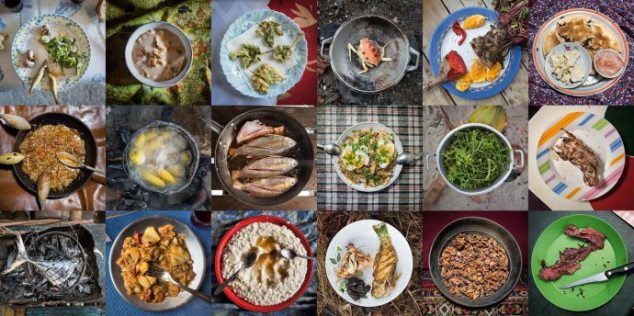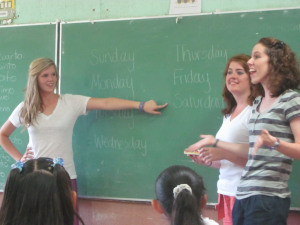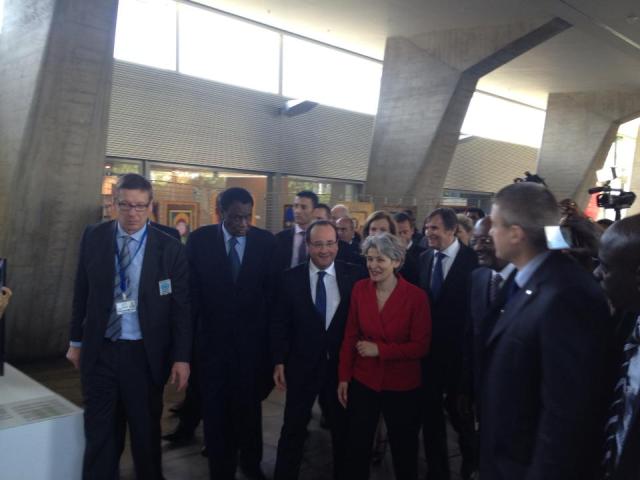Category Archives: Uncategorized
Is your TEFL ticket past its sell-by date?
 Excuse me, love, do you have any bangers and mash?
Excuse me, love, do you have any bangers and mash?
Travel, travel and more travel – that’s what everybody would like to do, if only they had the time and the money. “See the world, lad, before you settle down”, my grandad used to say. Of course, he was right. There is nothing like travel for seeing how the other half live, delving into exotic cultures and then realising the limitations of your own. For some of us, travel can be addictive. We soon get bored with the easy life at home and yearn for adventure. When the travel bug gets serious, we want to throw off our tourist garb and settle somewhere for a while, learn the lingo, fall in love, submerge ourselves. But how to earn an honest crust?
 Teaching English abroad is bags of fun when you’re young…
Teaching English abroad is bags of fun when you’re young…
Well, if you are lucky enough to be a…
View original post 1,049 more words
My goodness, it seems to be a read-aloud…
Body Language: An Artistic Writing Tool
Excellent resource for you creative writers out there.
By Sharla Rae
Have you ever people-watched and tried to guess by facial expressions and body movements what people are feeling or thinking?
This non-verbal communication of emotion, state of mind or state of physical well-being is known as body language.
Body Language is one of the most artistic and useful tools in the writing craft.
The art:
Writers paint word visuals of a character’s movements in the reader’s mind and this art is crucial in making our characters look and act like real people rather than stick characters moving around on the page.
The tools:
I demonstrated how to use body language as a tool to eliminate clunky saidisms in my blog, “Dialogue Tags: How To Kill Some Of The Little Buggers,– showing who’s speaking rather than telling.
Body language may also be used to set the tone or atmosphere in a scene. Example: A character…
View original post 2,362 more words
Where are you from?
Well spoken!
How many times have you had that question? I think this topic has been done again and again. But I think the reason that it’s been covered so many times by third culture kids and global nomads is because it happens so frequently in our lives, and it always takes us 20 times longer to answer the question than anyone else. And we either feel uncomfortable or arrogant in answering the question.
I think we (TCKs) all have that little 1 minute speech memorized by now. I don’t know about you, but I’m constantly trying to shorten it. Because I just always feel that it sounds so pompous: “My dad is French; my mom is Belgian. But I’ve never lived in either of those countries. I was born in Tokyo, moved to Dusseldorf, Johannesburg, Vienna, Hamburg and then did my undergrad in the US.” And I have no desire to…
View original post 513 more words
Do keep in touch…
This resonated so much with me. Reblog this if you are or once was an expatriate or if you have simply known people in your life that you might never see again.
Marcel Proust once quipped: “friends are for cowards”. Not so, you might say. But I think he had a point. Sociable people who plan their lives around a group of close friends do not really possess the adventurous spirit; they tend to stay in one place and neither have the courage nor the desire to take off alone around the world and make a new life. They are homebirds. Often I envy them.
But if, like me, you have spent most of your life moving around, the friends you make along the journey are only temporary. For the traveller, this is a kind of tragedy: most of the people you meet and grow to like, or love, you never get to see again, and some you miss for the rest of your life. As you get older the past becomes a vast dark space, filled with faces you once knew…
View original post 558 more words
François Hollande Official Visit to UNESCO

French President François Hollande with UNESCO Director General Irina Bokova at UNESCO. President Hollande arrived on June 5th to claim the Felix Houphouet-Boigny Peace Prize awarded by UNESCO every year to honour those who contribute to peace and stability. He was awarded the prize for the French military intervention in Mali and was accompanied by several African heads of state, including Dioncounda Traore, then president of Mali.
Photo by Diogo Amaro, used with permission
Hitting the Jackpot: My First internship
I secured my first work placement ever during my second year of University quite by accident. As a non-UK national studying in the UK, my campus in Farnham had an International Students Advisor specifically to deal with non-British students like myself. During our conversation that day, it emerged that her brother was working for euronews, the pan-European TV and online news channel that was based in Lyon, where my parents had settled during my first year of University. Faced with the prospect of unpaid work experience at a local radio or TV station reporting about a charity’s latest project, the opportunity was too good to miss. With his contact details at hand, she urged me to contact him. Within 10 days of sending my first email, I had a response.
In order to take a work placement in France, a document known as a convention de stage (work placement agreement) is required of all prospective interns. Finding out just what it was proved easy, with the help of my parents and some independent research. Obtaining the appropriate document was another story altogether. That took a bit more research into finding the appropriate representative for my University to sign the document. I found a sample convention de stage in both English and French from the University of Warwick’s website but my University had no similar copy.
It was therefore up to the Head of Student Administration to change the letterhead of the agreement and replace the University of Warwick with the University for the Creative Arts. The wait was agonising even without my parents continued pressure to get the task over and done with as quickly as possible saying that my time was running out. But at last, I found my documents completed and forwarded to the Human Resources Manager in Lyon.
The internship itself started later and ended sooner than I anticipated. Although I was told that my credentials were acceptable in April, it wasn’t until August that I began to work. The first day was pleasant enough at first, meeting the members of the English news team as well as members of other language teams. From there, I was shown how my news bulletin would be recorded in a small booth the size of a British telephone booth with a small screen and voice recorder. It was a nerve-wracking experience, trying to write a script for my news bulletin and thinking that somehow my frightened inexperienced voice would be heard by someone else in a sitting room far away.
To my surprise (and relief), I was given more of an explanation as to how the internship would work. For two weeks, I was to shadow the members of the team, taking note of how they proceeded and what sort of equipment was used. I could even take a shot at recording a news bulletin or two, but my voice would not be broadcast due to French laws protecting interns from unpaid work. I wouldn’t be the dogsbody, making photocopies or cups of tea for senior staff. It was purely a learning experience. Even the articles I wrote for the website would not have a by-line. But I learned not to care, as long as I could add in my CV that I really had done practical work.
With time running low and so many things to explain to my peers at University, I fortunately had the presence of mind to put together a video diary of my experience. As far as filming goes, I admit that it is not the work of a professional but I hope that the thousand pictures that unfold before your eyes will tell you more than the thousand words I may write here.
Epiphany (2 of 2)
My evolution as a journalist has been anything but smooth. From embarrassing mistakes to modest successes, I finally came to a conclusion. I loved writing about art, culture, entertainment and the environment. I wrote about what I thought I was passionate about. The truth was, I wasn’t so knowledgeable about any of those subjects that I could write long-winded musings and analyses that I read in the so-called “quality newspapers”. Nor was I content with spewing stories about scandals and outrages and famous people that appealed to the perverse side of curiosity. Everything I ever wrote just sounded like rubbish. Too academic, not smart enough; too long-winded…the list of faults could go on forever.
But I had an epiphany tonight. I am writing down as fast as I can, while my epiphany lasts. Any minute longer and I may forget my ideas and let another project die. The fact is that I don’t know how to write like Robert Fisk or Janine Di Giovanni. I don’t have all the resources they have. And I don’t really want to be their carbon copy. All I have is the ability to write creatively and the tendency to be in exciting situations. Sometimes I am prepared to document it all, be it by pen, camera or Dictaphone. Sometimes, the turbulence catches me on an off day.
If there is one thing I’ve learned in Journalism, it’s that everyone has a story to tell. As long as a living being has a past, a present and a future, there is never a boring moment in life. And because of this, journalism is necessarily subjective. To be well informed of the world around us and to make sense of it all, it goes without saying that we need an equal amount of information and opinion on both sides of the story. But as we delve deeper, it gets harder and harder to remain detached.
I’m starting this blog like many other people, writing about my personal experiences and my opinions. I don’t claim to be an expert in the things I see before me. I hope not to bore you with wordy analysis. I am just a witness to history, like so many people before me. If journalism is the first draft of history, this is the first of many drafts. I have a voice, like everyone else and I mean to have it heard. There won’t be a dull moment when I write about what I write.
The rest is up to you, dear reader. Read my work if you wish. Comment and let me know what mistakes I have made or what your thoughts are. Or just enjoy reading. And wish me luck from here on out.
Epiphany (1 of 2)
*A piece written by stream of consciousness on September 20, 2012. Reading this will help you understand how I intend to go about making this blog.
I graduated from University with a Bachelors of Arts in Journalism, thinking that it would be ideal for a creative writer. It was the chance for me to write about books and films, the environment and the arts and every other curiosity I thought I knew and understood.
As time went by and I really learned what journalism was like in practical terms, my tutors gave me their insight into my development as a journalist in training. My weakness, they said, was not like that of my peers. While many of my classmates struggled to write academic essays and managed to write reasonably well as journalists, I excelled in academic research and writing but struggled as a reporter. The good news was that I had news sense. I had a way of knowing what was newsworthy, something that could not be taught.
I chose to specialise in Radio Journalism because I felt that I didn’t have the right personality type to be a presenter or news anchor. My strength was in my voice, I believed. With the fast paced evolution of new social networking technologies and the ever-changing landscape that is modern journalism, I chose to specialise in Online Journalism. I wrote for WordPress and Blogger individually and with a group as was required by my tutors. It was there that I understood that my greater success came from combining my writing with a strong team of technically able people.